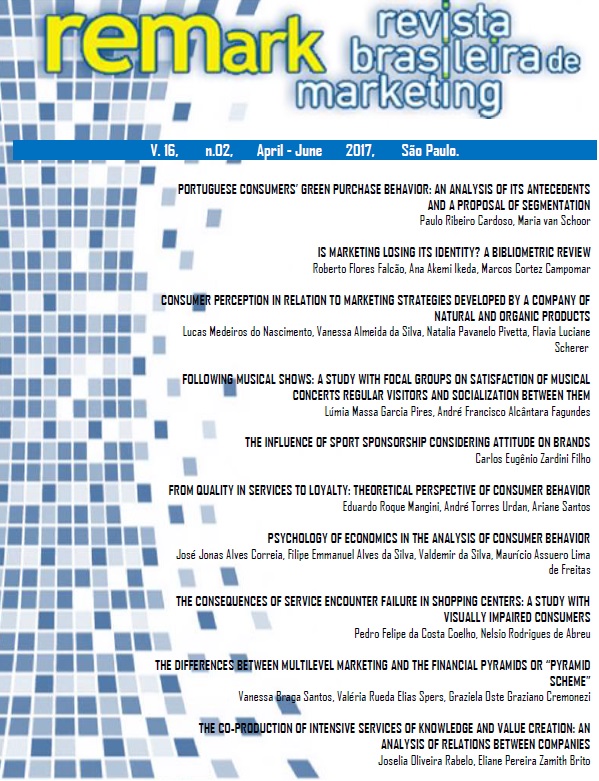Portuguese Consumers’ Green Purchase Behavior: An Analysis of its Antecedents and a Proposal of Segmentation
DOI:
https://doi.org/10.5585/remark.v16i2.3229Keywords:
Green Purchase, Green Consumer, Consumer Behavior, Segmentation.Abstract
This study analyzes how “Knowledge about environmental problems,” "Perceived consumer effectiveness,” and "Recycling behavior” can predict “Reported purchase of green products in general,” and “Reported purchase of specific green products.” Another objective of this study is to identify different consumer segments based on antecedents of green purchasing behavior, observing demographic profiles and willingness to buy this type of products. The data was collected in Portugal with the use of an online survey and the instrument was composed of five scales, adapted from previous studies. The results confirm the existence of a positive relationship between the constructs. It is also possible to identify three segments of consumers: “Less involved,” “Moderate,” and “Ecologists.” This study has some practical implications, showing that consumption of green products can be stimulated if consumers are more aware of environmental problems and understand the importance of their individual behavior to prevent them.Downloads
Downloads
Published
2017-06-30
How to Cite
Cardoso, P. R., & van Schoor, M. (2017). Portuguese Consumers’ Green Purchase Behavior: An Analysis of its Antecedents and a Proposal of Segmentation. ReMark - Revista Brasileira De Marketing, 16(2), 140–153. https://doi.org/10.5585/remark.v16i2.3229
Issue
Section
Articles
Bairrada C.M. (2024)
Attitudes toward Ethical Consumption in Clothing: Comparing Peruvian and Portuguese Consumers. Journal of International Consumer Marketing, 36(2), 180-196.10.1080/08961530.2023.2200221
Ribeiro Cardoso P. (2023)
Effects of awareness campaigns against domestic violence: perceived efficacy, adopted behavior and word of mouth. Journal of Criminological Research, Policy and Practice, 9(3-4), 177-192.10.1108/JCRPP-11-2022-0057
Klabi F. (2023)
Exploring the relationships between Islam, some personal values, environmental concern, and electric vehicle purchase intention: the case of Saudi Arabia. Journal of Islamic Marketing, 14(2), 366-393.10.1108/JIMA-06-2020-0170
Correia E. (2023)
Analysing the Influence of Green Marketing Communication in Consumers’ Green Purchase Behaviour. International Journal of Environmental Research and Public Health, 20(2), 10.3390/ijerph20021356
Sousa S. (2022)
Analysing the Influence of Companies’ Green Communication in College Students’ Green Purchase Behaviour: An Application of the Extended Theory of Planned Behaviour Model. Administrative Sciences, 12(3), 10.3390/admsci12030080
Luengo-Valderrey M.J. (2022)
Ecological behaviour in times of crisis and economic well-being through a comparative longitudinal study. Journal of Cleaner Production, 359, 10.1016/j.jclepro.2022.131965
Karbasi A. (2021)
Investigating the factors affecting consumers purchasing behavior of green food products. Journal of Food Science and Technology (Iran), 18(117), 343-352.10.29252/fsct.18.08.27
Da Silva R.F. (2021)
Scientific publications about green marketing a bibliometric perspective. Revista Digital de Biblioteconomia e Ciencia da Informacao, 19, 10.20396/RDBCI.V19I00.8666154
Correa C.M. (2018)
Greenwashing's relationship with market reputation and consumer discount. Revista Brasileira de Marketing, 17(4), 590-602.10.5585/remark.v17i4.4162
Views
- Abstract 553
- PDF (Português (Brasil)) 811








